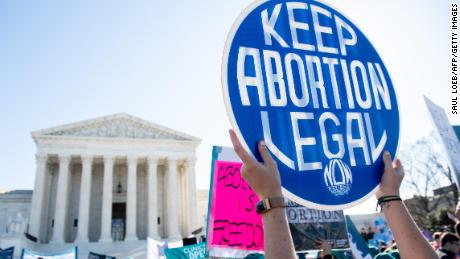The vote of the panel was 2-1.
The Texas law bans abortions after fetal cardiac activity is detected, which usually happens about six weeks into a pregnancy and often before a woman knows she is pregnant. It’s been the subject of heated litigation since before it took effect at the beginning of last month.
The Justice Department has challenged the law in federal court. US District Judge Robert Pitman on October 6 blocked the ban. Texas appealed, and two days after Pitman’s order, a three judge-panel of the appeals court put a brief administrative hold on the order. That appellate panel has now extended that hold to last while it considers Pitman’s order on appeal.
Appellate Judges Catharina Haynes, a George W. Bush appointee, and James Ho, a Donald Trump appointee, voted to let the law remain in place. Judge Carl Stewart, a Bill Clinton appointee, dissented.
With the 5th Circuit’s latest move, the Justice Department is expected to turn to the Supreme Court with a request to halt the law.
The Supreme Court had declined to block the law after clinics requested an intervention earlier this year.
Law’s novel approach stymies attempts to block it
The morning after Pitman’s order came down, some clinics in Texas resumed providing abortions to patients who were beyond six weeks in their pregnancies. They did so at some legal risk, as the Texas law allows enforcement actions to be brought for abortions conducted while a court order blocking the law is in effect, if the order is later reversed by a higher court.
Rather than task government officials with enforcing the ban, via criminal or administrative penalties, the law deputizes private citizens to bring state court litigation against providers or anyone who assists a woman in obtaining an abortion after fetal cardiac activity is detected.
The design of this enforcement mechanism has been mostly successful in limiting other legal attempts — by clinics and others — to get the law enjoined, because it complicated the usual route of seeking court orders against specific government officials who are usually in charge of implementing restrictive abortion laws.
“Fully aware that depriving its citizens of this right by direct state action would be flagrantly unconstitutional, the State contrived an unprecedented and transparent statutory scheme to do just that,” Pitman wrote in his order that temporarily halted the law last week.
“From the moment S.B. 8 went into effect, women have been unlawfully prevented from exercising control over their lives in ways that are protected by the Constitution,” Pitman said. “That other courts may find a way to avoid this conclusion is theirs to decide; this Court will not sanction one more day of this offensive deprivation of such an important right.”
Texas says feds can’t sue
Texas Attorney General Ken Paxton had urged the 5th Circuit earlier Thursday to let the law remain in effect during the appeals process.
Paxton argued that the Biden administration does not have the legal right to bring suit in the case, even if the law were crafted in a way to avoid review in federal court.
“The federal government’s position boils down to a simple — but erroneous — claim: A law that avoids pre-enforcement review in federal district court is an open threat to our constitutional order,” the Republican state attorney general wrote. “That is ahistorical nonsense.”
A key issue in the case is whether the federal government has the legal right or “standing” to bring the challenge. The Justice Department says it does, in part, because private individuals bringing suit are acting as agents of the state and the government has the power to protect the fundamental rights of its citizens.
US Attorney General Merrick Garland, in announcing the lawsuit last month, referred to the law as a “scheme” and said it “is clearly unconstitutional under longstanding Supreme Court precedent.”
“The United States has the authority and responsibility to ensure that no state can deprive individuals of their constitutional rights through a legislative scheme specifically designed to prevent the vindication of those rights,” he said.
But Paxton says the federal government doesn’t have the right to step in.
He is supported by a brief filed by Jonathan Mitchell, one of the architects of the law now representing three individuals who are interested in bringing lawsuits against those who may violate it.
Mitchell wrote that the states “have tools in their arsenal to limit the judiciary’s opportunities to pronounce their statutes unconstitutional.”
Mitchell said that states can structure their laws in a way that “reduces or eliminates” them from being challenged before they are enforced. “And that is what Texas has done,” he said. “By prohibiting state officials from enforcing the statute and by authorizing the citizenry to enforce the law through private civil-enforcement actions, Texas has boxed out the judiciary from entertaining” such challenges.
Mitchell added that abortion is “not a constitutional right” but “a court-invented right that may not even have the majority support on the current Supreme Court.”
The Supreme Court is taking up a direct challenge to the 1973 Roe v. Wade decision, which legalized abortion nationwide, in December.
This story has been updated with additional details Thursday.






